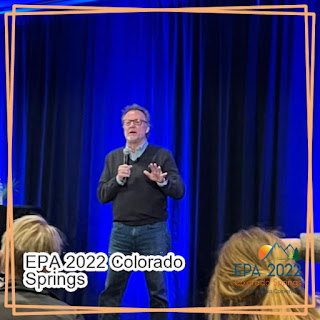By Terry Whalin @terrywhalin
After a two-year delay because of
the pandemic, last week the Evangelical Press Association meetings took place in Colorado
Springs, Colorado. While I'm a former board member of the EPA and have worked
planning a number of their conventions, I had not been to one of their
meetings in 20 years—because I'm mostly in the book world with some continuing
magazine work. It was a great experience to return to a live event. In this
article, I want to give you some of the distinctions and value of these
opportunities.
The Give and Take
Conversations
Whether you are standing around
drinking coffee at a break or meeting people around you during a workshop, there
is a give and take in the conversation that does not happen on the phone or
virtually but does happen at live events. I saw a number of old friends and had
the opportunity to get an update, hear about their work, tell them about some of
my work and exchange business cards (because this information often changes over
the years). A number of these people I had not encountered face to face in years
and the exchanges were priceless in my view. As I've often said in this publishing business, who you know is almost as important as what you know. These types of
exchanges happen over and over during these types of events.
Meeting and Making New
Friends
Whether I was sitting at a meal
at the event or any other place, these events give the opportunity to get
acquainted and learn about each other and exchange business cards. In a
publishing world that is often saying “no” or sending a silent rejection (no
response), I was one of the few (if not the only book acquisitions editor) at
this event. I made a point to often say and show that I am actively looking for
new authors and new books. Who knows what will come from it but I was certainly
trying in my conversations and actions to open the doors of
opportunity.
The Opportunity to
Teach
At the EPA meetings, I taught two
workshops—one on social media and a second on book proposals. The first one on
social media was a part of the overall conference with a much larger attendance.
The second one about book proposals was added to the schedule when the overall
event was delayed two years with the pandemic. For each of my handouts and
presentations, I appreciated the opportunity to give back to others and provide
value from my resources and experience. I also appreciated the opportunity to hear other speakers and workshop leaders. I found great value in attending different workshops during the event.
Open to the Unexpected
I made a point to introduce
myself to several of the main speakers at this event. To my surprise, one of
them followed my work on social media and was appreciative of what I do in this
area. Until I had this exchange face to face, I had no idea that he was aware of
me and my work. I suspect there will be opportunity to work together in the days
ahead—particularly if I follow-up (which I will). From attending live events for
years, I know the follow-up emails and other connections are some of the most
important actions for anyone attending these events.
In the next few weeks, I will be
attending other events. Follow this link to my schedule and I hope to see you at one
of these events and talk face to face.
There were many more things which
come from these live events but these are a few of the distinctions from these
opportunities. What am I missing? Let me know in the comments
below.
Labels: book proposals, business cards, Evangelical Press Association, giving back, opportunity, publishing, social media, teaching, Terry Whalin, The Writing Life, Why Live Events Are Valuable, workshops






























